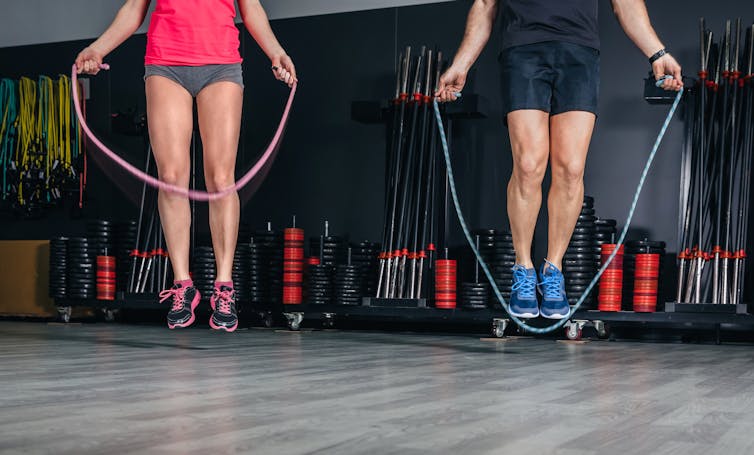While many of us may remember skipping as something we did as children, the pastime has regained popularity during the pandemic as a way of keeping fit.
Not only is jumping rope a fun, affordable and portable form of exercise, it also has many benefits for our health and fitness. Here are just a few reason why jumping rope is such a good form of exercise:
1. It improves cardiovascular fitness
Jumping rope has long been used by boxers as a form of training to help improve their footwork and general conditioning.
Jumping rope will cause an increase in heart rate and breathing similar to if you went jogging. If you were to do ten minutes of jump rope everyday, you would create adaptations to your body that are beneficial to cardiovascular health, such as lowering blood pressure and reducing resting heart rate.
Jumping rope will also increase your cardiorespiratory fitness which essentially means your body becomes more efficient at taking up and using oxygen.
Research has shown that cardiorespiratory fitness is linked to improved health and longevity. Improved cardiorespriatory fitness has been shown to reduce blood pressure, improve insulin sensitivity, reduce inflammation in the body and lower chances of developing diabetes and many other chronic disease.
2. It’s a full body workout
Skipping is a full body workout which uses your abdominal muscles to stabilise the body, your legs for jumping, and your shoulders and arms for turning the rope. It therefore provides an all over workout rather than just isolating one portion of the body.
Full body workouts increase muscle tone, which will help with all daily activities, and increase our resting metabolism, which helps us burn calories even while resting.
3. It improves coordination and motor skills
Skipping involves coordination to time your jump with the rope. Research has shown that it improves coordination, balance and basic movement skills in children. These are important fitness components for later in life as they reduce our chances of trips and falls.
There are so many different exercises you can do with the rope and each one requires different coordination to complete the exercise. This may help exercise your brain as well.
4. It increases bone mineral density
Jumping rope involves making impact with the ground with every jump. These impacts cause our bones to remodel themselves to become stronger, thus increasing bone density. Bone density can be a benefit later on in life, when it naturally begins to decrease.

David Pereiras/ Shutterstock
Research has shown that jumping rope increases bone mineral density. Higher bone mineral density makes you less likely to break a bone or develop osteoporosis as you get older. Hip fractures are a major cause of morbidity and mortality in older people, leading to loss of independence and a huge economic burden. Improving bone density and balance throughout your life reduces the chances of trips and falls later on.
5. It increases speed
Because jumping rope requires fast movement of the feet and arms, it’s considered a plyometric exercise. This is where the muscles exert maximum force in short intervals of time, with the goal of increasing power.
Plyometric exercise is used in the sporting world to increase an athlete’s speed. A lot of exercises, such as jogging, only improve cardiovascular health – whereas jumping rope has the added benefit of improving speed as well. Daily jump rope practice may help you run quicker than before.
6. Time efficient
Jumping rope offers many health benefits that may be achieved in a short period of time. Because it’s a full body exercise that requires speed and coordination, you could argue that it’s a form of high intensity interval training (HIIT).
HIIT exercise is where you have short bouts of high intensity efforts followed by a short rest intervals. This is repeated several times. HIIT has been shown to produce higher levels of cardiorespiratory fitness in comparison to traditional endurance training.
It’s also more time efficient, as you can perform exercise over a shorter period. This is why HIIT training has become the most popular workout worldwide.
Jumping rope is easily adaptable, and can be a high-intensity workout depending on the effort and power a person puts into their training.
7. Enjoyable
One of the most important points we need to consider to help us change our exercise habits is that what we do needs to be enjoyable to us. One of the biggest barriers for people when it comes to sticking with exercise is enjoyment. And research shows enjoying exercise is critical for helping us change our exercise habits and continue exercising.
The great thing about skipping is that there are so many different ways you can jump, and hop over the rope. You can create a varied workout which helps maintain your enjoyment.
However, it’s worth noting that skipping can put a lot of force on our lower limbs when we land. Though this improves our bone mineral density, it can lead to lower-body injury, especially if we’re not used to this force. But different jumping styles can be used to help ease force and reduce chance of injury. As with all types of exercise, it’s good to build up duration gradually. This will help minimise injury.
Overall, jumping rope could be a very beneficial form of exercise. Not only does it improve many important aspects of our health – including cardiovascular health, and improving bone density – but it’s also affordable, portable and doesn’t require much space.![]()
Lindsay Bottoms, Reader in Exercise and Health Physiology, University of Hertfordshire
This article is republished from The Conversation under a Creative Commons license. Read the original article.

Leave a Reply
You must be logged in to post a comment.